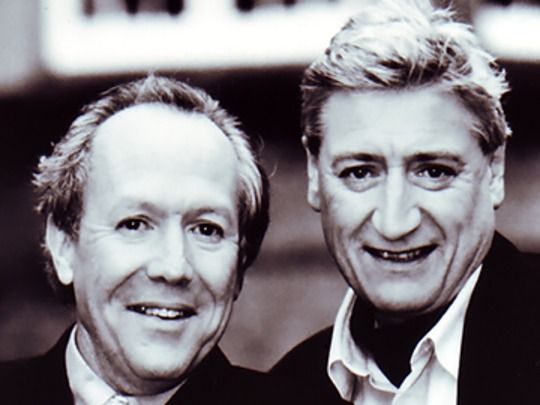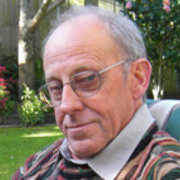
McPhail & Gadsby
Television, 1980–1987, 1998
Comedy on the go: the director/producer's perspective
Preceded by a series of one hour, single subject sketch comedy programmes in 1980 — and by the earlier and hugely successful A Week of It — the political satire version of McPhail & Gadsby began its seven-year, award-winning run in 1981.
Producing two series of seven programmes, plus several specials each year, was a challenge for all those concerned. There was a fairly rigid schedule to adhere to in order to churn out a top-rated satirical sketch show each week, for 14 weeks of the year — 112 programmes over seven consecutive years.
During that time the modest Christchurch production studios of TVNZ were arguably the busiest in the country, and facilities had to be booked well in advance to secure both time and equipment; planning was premium.
Typically, each series would extend over 12 weeks. Four weeks of preparation that included writing of non-topical sketches, songs and commercial spoofs, followed by two weeks recording and post-production, put a few sketches per programme in the can. The writers — almost exclusively A K Grant, David McPhail and Jon Gadsby — had an uncanny way of anticipating events so that these sketches, written sometimes six weeks before broadcast, remained topical.
We were sometimes criticised for not allowing other writers into the 'clique'. It was not a conscious thing; more a matter of there being such a close-knit collaboration between the three established writers and the production team that we were seldom able to accommodate material from outside, because it was usually out of date by the time it arrived — this was the early 1980s, and even fax machines had not been perfected!
The production week started on Tuesday with a concept meeting when the writers needed to agree on possible content for that week's show. Writing was always done away from the TVNZ office — usually at Jon Gadsby's apartment: a quiet and leafy environment in the suburbs.
As the writing progressed, sketch details were phoned through to the production office and discussed with regard to staging, casting, wardrobe, make-up etc. Frequently, the casting was dependent on who could look and sound most like the political character they had to portray — acting ability was just a part of it!
A huge advantage was that David McPhail was an accomplished TV producer and director with an astute vision for what would work within our available resources (but not always within our minute budget!). As agreement was reached on the various sketches, calls were made to the key production people to give them an idea of what was required for the week.
By Wednesday afternoon, after only one and a half days writing, the programme existed: on paper at least. Mid-afternoon, about 20 people assembled for the production meeting. This was the nitty-gritty of the production: all the details for every facet of the programme had to be well organised in order to get sets built, props located, actors booked, wardrobe and make-up organised in time for the studio record on Friday.
Thursday was a day of total confusion verging on near panic. The phone won't stop ringing. Props can't find a green X,Y or Z — will a blue ABC do instead? Yes but it can't be blue. Bugger — then we'll have to paint it! The writers are still working and David rings about a new sketch — a quick read through on the phone. Sounds good, but it needs to be set in the Swiss Alps! Ok, we'll get the background from a travel brochure photo and chroma key [a technique for combining two images together] the actors. Design can knock up a bit of a chalet for the foreground. Should work. Design rings — chalet no problem, but does the door to the RFU head office hinge on the left or right? Left; I've got to be able to shoot in, from the outside. Make-up doesn't have a wig to fit one of the cast — can they buy one? Another new sketch from the writers — don't panic, its just a quickie. Well three quickies really!
At three o'clock on Thursday afternoon, the cast, writers and key crew assemble in a small meeting room for a so-called rehearsal. It's a timed read-through really and an opportunity to test the sketches for laugh value. The meeting room is in the middle of a suite of offices occupied by upper management and accountant types. The walls are thin and the test is if you can hear them laughing in their offices, then the sketch will work. It usually does. Rehearsal finishes at around 6pm. Now it is time to start camera scripting. Home by 10.30.
Friday, 0800 hours, Studio 4, Gloucester Street Christchurch. A blur of activity as design, staging, props, cameras and lighting, all in a well-choreographed jostle, get ready for "hot Cameras" at 0830.
Behind the studio, wardrobe and make-up is a rumpus room of wigs, clothes and semi-costumed actors. There's a loud chorus of lines being learned for several different sketches — all at the same time. The studio is small, and with an average of 14 sketches to be recorded for each programme, it is a challenge for all concerned. The loading bay provides a useful annex to the studio. Sets are built while the sketches are being rehearsed and often the paint is still wet as they are being taken out of the studio!
"G'night Rob". "Night Bill". "Night Rob — goodnight Marilyn ..." "Hey Rob ..." "Go to sleep Winston!" Etc.
So ends the recording of the sketch material for another programme. The Beehive closing sketch was always the last thing to be recorded. With only one camera and two or three voice actors it's all done by 1830 hrs. Now the editing and compilation required to assemble it all into another "top rated" episode. Finish: sometime after midnight.
Saturday afternoon in the cafeteria at TVNZ Gloucester Street. A small crowd of about 30 to 40 enthusiastic and mostly familiar faces assemble for a glass or two of cask wine and a good laugh. In the sound caravan, parked out the back, the sound engineer rolls the replay and captures the reaction on a multitrack sound recorder. After the replay, a few more wines and an analysis of the laughter [or lack of it], the complete soundtrack is mixed (along with any required sound effects) and dubbed back to the master videotape.
Sunday or Monday night: the show bares its soul to the expectant and discerning New Zealand television audience. Then gets ready to do it all over again next week.
- During his long television career John Lye directed and produced comedy, music shows (That's Country) wrestling (On the Mat) and live episodes of This is Your Life.
